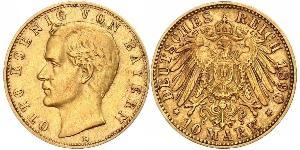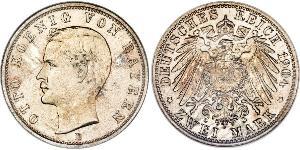|
|
This article may be expanded with text translated from the corresponding article in the German Wikipedia. (June 2012)
Click [show] on the right to read important instructions before translating.
|
| This article needs additional citations for verification. (June 2012) |
| Otto | |
|---|---|
 |
|
| King of Bavaria | |
| Reign | 13 June 1886 – 5 November 1913 |
| Predecessor | Ludwig II |
| Successor | Ludwig III |
| House | House of Wittelsbach |
| Father | Maximilian II of Bavaria |
| Mother | Marie of Prussia |
| Born | 27 April 1848 The Residence, Munich |
| Died | 11 October 1916 (aged 68) Fürstenried Palace |
| Burial | St. Michael's Church, Munich |
| Religion | Roman Catholicism |
Otto (German: Otto Wilhelm Luitpold Adalbert Waldemar von Wittelsbach; 27 April 1848 – 11 October 1916), was King of Bavaria from 1886 to 1913. He was the son of Maximilian II and his wife, Marie of Prussia, and younger brother of Ludwig II. King Otto of Bavaria is not to be confused with King Otto of Greece, who was his uncle and godfather.
Contents
Childhood and youth[edit]
Prince Otto was born on 27 April 1848, two months premature, in the Munich Residenz. His parents were King Maximilian II of Bavaria and Marie of Prussia. His uncle King Otto I of Greece served as his godfather.
Otto had an older brother, the Crown Prince Ludwig. The brothers spent most of their childhood with their teachers at Hohenschwangau Castle. Between 1853 and 1863, they spent their summer holidays at the Royal Villa in Berchtesgaden, which had been specially built for their father.[1][2]
Otto served in the Bavarian army from 1863. He was appointed sub-lieutenant on 27 April 1863 and admitted to the Cadet Corps on 1 March 1864. On 26 May 1864, he was promoted to full lieutenant.
On 10 March 1864, Otto's father died and his brother Ludwig succeeded as King of Bavaria. Between 18 June and 15 July 1864, the two brothers received state visits by the emperors of Austria and Russia.
Otto was promoted to Captain on 27 April 1866 and entered active military service in the Royal Bavarian Infantry Guards. In 1868, he became a member of the Order of St. George, the house order of the House of Wittelsbach. He participated in the Austro-Prussian War of 1866 and as colonel in the Franco-Prussian War of 1870-1871. When Wilhelm I was proclaimed German Emperor on 18 January 1871 at the Palace of Versailles, Prince Otto and his uncle Luitpold represented King Ludwig II, who refused to participate.[3][4] Otto then criticized the celebration as ostentatious and heartless in a letter to his brother.
In general, Otto had a cordial relation with his brother, demonstrated in their joint undertakings. For example, they visited the Wartburg together in 1867. In 1868, Otto received the Royal Order of Saint George for the Defense of the Immaculate Conception, the house order of the House of Wittelsbach. In 1869, he joined the Order of the Holy Sepulchre, on the initiative of Cardinal Karl-August von Reisach.[5]
Mental incapacity[edit]
In 1865 Otto started to show the first signs of a mental disorder. His condition began to deteriorate rapidly after the end of the Franco-Prussian war. From 1871, he increasingly avoided encounters with strangers. He was placed under medical supervision and reports about his condition made it to the Chancellor Otto von Bismarck. He was officially classified as mentally ill in January 1872. From 1873, he was held in isolation in the southern pavilion of Nymphenburg Palace. His attending physician was Dr. Bernhard von Gudden, who was considered a coryphée in the field of mental health care.[citation needed] Dr. von Gudden confirmed Otto's disease in a further report in 1873.
During Corpus Christi Mass 1875 in the Frauenkirche in Munich, there was a sensational incident, when Otto – who had not attended the church service – stormed into the church wearing hunting clothes and fell on his knees before the celebrant, Archbishop Gregor von Scherr, to ask forgiveness for his sins. The High Mass was interrupted and the prince did not resist when he was led away by two church ministers. Otto was then moved to Schleissheim Palace and guarded more carefully. His last public appearance was his presence at the side of his brother at the King's parade on 22 August 1875 at the Marsfeld in Munich. From 1 June 1876, he stayed for a few weeks in the castle at Ludwigsthal in the Bavarian Forest. In the spring of 1880, his condition worsened. In 1883, he was confined under medical supervision in Fürstenried Palace near Munich, where he would remain for the rest of his life. This palace had been specially converted for his confinement. King Ludwig II occasionally visited him at night, and ordered no violence be used against Otto.
Both Otto and his brother Ludwig II were reported to be depressed or mentally ill. At the time, psychiatry was still in its infancy and this diagnosis was based on statements made by third parties from which the first psychiatrists formed vague clinical pictures. In 1886, the senior royal medical officer wrote a statement declaring that Otto was severely mentally ill.[6] Today it is assumed that while Ludwig had a schizotypal personality disorder, Otto suffered from schizophrenia.[7]
King of Bavaria[edit]
On 10 June 1886, the Bavarian cabinet declared King Ludwig II unable to rule and appointed his uncle Luitpold as Prince Regent. Ludwig died only three days later, under unexplained circumstances. This meant that Otto became King on 13 June 1886. He was however, unable to rule. The official explanation was that the King is melancholic. The proclamation of his inauguration was read to him at Fürstenried castle the next day, but he failed to understand it, and held his uncle Luitpold for the rightful King.
Luitpold kept his role as Prince Regent until he died in 1912 and was succeeded by his son Ludwig, who was Otto's first cousin.
End of reign and death[edit]
By 1913, it was obvious that Otto would never be able to actively reign. The constitution of Bavaria was amended on 4 November 1913, to include a clause specifying that if a regency for reasons of incapacity lasted for ten years with no expectation that the King would ever be able to reign, the Regent could proclaim the end of the regency, depose the King and assume the crown himself
The following day, Prince Regent Ludwig proclaimed the end of his regency and assumed the crown in his own right as Ludwig III. The parliament assented on 6 November, and Ludwig III took the constitutional oath on 8 November. King Otto was permitted to retain his title and honours until his death in 1916.
Otto died unexpectedly on 11 October 1916, due to a volvulus (an obstruction of the bowel). His remains were interred in the crypt of the Michaelskirche in Munich. Bavarian tradition called for the heart of the king to be placed in a silver urn and sent to the Gnadenkapelle (Chapel of the Miraculous Image) in Altötting, beside those of his brother, father and grandfather.
Styles[edit]
- 27 April 1848 - 13 June 1886: His Royal Highness Prince Otto of Bavaria
- 13 June 1886 - 5 November 1913: His Majesty The King of Bavaria
- 5 November 1913 - 11 October 1916: His Majesty King Otto of Bavaria
In popular culture[edit]
Otto was portrayed by the actor Klaus Kinski in the movie Ludwig II: Glanz und Ende eines Königs. This role was the first time Kinski drew attention in Germany and internationally.
Ancestors[edit]
References[edit]
- Cajetan von Aretin: Die Erbschaft des Königs Otto von Bayern. Höfische Politik und Wittelsbacher Vermögensrechte 1916 bis 1922, in the series Schriftenreihe zur bayerischen Landesgeschichte, vol. 149, C. H. Beck Verlag, Munich, 2006, ISBN 3-406-10745-1, also: thesis, University of Munich, 2006
- Heinz Häfner: Ein König wird beseitigt. Ludwig II von Bayern, C. H. Beck Verlag, Munich, 2008, ISBN 978-3-406-56888-6, p. 330 ff
- Arndt Richter: Die Geisteskrankheit der bayerischen Könige Ludwig II. und Otto. Eine interdisziplinäre Studie mittels Genealogie, Genetik und Statistik, Degener & Co., Neustadt an der Aisch, 1997, ISBN 3-7686-5111-8
- Alfons Schweiggert: Schattenkönig. Otto, der Bruder König Ludwig II. von Bayern, ein Lebensbild, Ehrenwirth, Munich, 1992, ISBN 3-431-03192-7
Footnotes[edit]
- ^ Walter Flemmer: Stationen eines Märchenkönigs. Orte und Landschaften König Ludwigs II.. In: Georg Jenal, with Stephanie Haarländer (eds.): Gegenwart in Vergangenheit. Beiträge zur Kultur und Geschichte der Neueren und Neuesten Zeit. Festgabe für Friedrich Prinz zu seinem 65. Geburtstag, Munich, 1993, p. 419
- ^ Heinz Häfner writes, in Ein König wird beseitigt, München, 2008, p 38: A court official found Otto bound and gagged by Ludwig, with Ludwig violently tugging at the rope. The official had to use force to free Otto. The King was shocked and angered by Ludwig's behaviour and demanded severe punishment. Ludwig was so embittered that he took a violent dislike of Berchtesgaden and did not return there for a long time.
- ^ Dr. Theodor Toeche-Mittler: Die Kaiserproklamation in Versailles am 18. Januar 1871 mit einem Verzeichniß der Festtheilnehmer, Ernst Siegfried Mittler und Sohn, Berlin, 1896
- ^ H. Schnaebeli: Fotoaufnahmen der Kaiserproklamation in Versailles, Berlin, 1871
- ^ Hans Jürgen Brandt: Jerusalem hat Freunde. München und der Ritterorden vom Heiligen Grab, EOS, 2010, p. 58 f
- ^ The University Department of Psychiatry in Munich: From Kraepelin and his predecessors to molecular psychiatry. By Hanns Hippius, Hans-Jürgen Möller, Hans-Jürgen Müller, Gabriele Neundörfer-Kohl, p.27
- ^ Prof. Hans Förstl, "Ludwig II. von Bayern - schizotype Persönlichkeit und frontotemporale Degeneration?", in: Deutsche Medizinische Wochenschrift, Nr. 132/2007
|
Otto of Bavaria
Born: 27 April 1848 Died: 11 October 1916 |
||
| Regnal titles | ||
|---|---|---|
| Preceded by Ludwig II |
King of Bavaria 13 June 1886 – 5 November 1913 |
Succeeded by Ludwig III |
|
||||||||||||||||||||||||||||||||||||||
|
||||||
- 1848 births
- 1916 deaths
- House of Wittelsbach
- Knights of the Golden Fleece
- People from Munich
- Kings of Bavaria
- Princes of Bavaria
- Grand Masters of the Order of Saint Hubert
- Grand Masters of the Royal Order of Saint George for the Defense of the Immaculate Conception
- Roman Catholic monarchs
- Burials at St. Michael's Church, Munich












